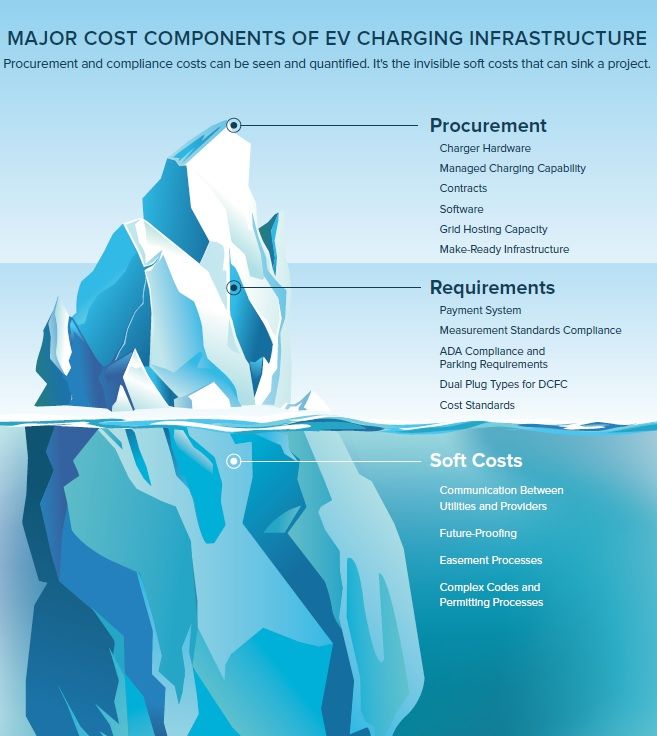The U.S. solar industry has spent a decade working to streamline and reduce the "soft costs" of projects, which include less-visible expenses in areas like customer acquisition, permitting, financing and installation. Now it's time for the growing EV charging industry to do the same.
A new report from the Rocky Mountain Institute provides clarity on the cost ranges for components, such as Level 2 and direct-current (DC) fast charger stations, and offers recommendations for reducing overall EV charging infrastructure costs.
“There’s been a real lack of knowledge out there about what this stuff costs or what it should cost,” Chris Nelder, co-author of the report and manager of RMI’s EV-Grid Integration initiative, told GTM.
To get a clearer picture of the cost of EV charging infrastructure today, Nelder and co-author Emily Rogers conducted two dozen interviews with representatives from across the industry, including utilities, hardware providers, software providers, network charging operators and transit agencies.
The research revealed that costs for charging infrastructure components ranged from $2,500 up to $7,210 for a Level 2 commercial charger and from $20,000 up to $35,800 for a 50-kilowatt DC fast charger.
In the report, titled Reducing EV Charging Infrastructure Costs, the authors analogize EV charging infrastructure’s trajectory to that of solar.
“The cost of EV chargers is following a progression that is very similar to that seen in the solar sector over the past decade," the report says. These days, soft costs are "frequently cited as more significant cost drivers" than physical components, as the cost of charging-station hardware comes down.
But the reality today is that such soft costs "are poorly understood, very hard to quantify, and almost entirely undocumented in the literature," the report notes.
Opportunities to slash EV charging infrastructure costs
Nelder and Rogers identify a range of opportunities to bring costs down. Take the example of the benefits of grouping chargers at a single site.
According to the report, the average installation cost for a commercial Level 2 charge port is $4,173 for a single charger. But add a second charger at the same site and the per-unit cost falls to $3,367. Install six or more charge ports at the same site and the per-unit cost drops to $2,638.
Another example: Simply siting charging stations in the right place on a given property.
“The cost of trenching (about $200 per linear foot) and laying conduit can add thousands of dollars to project costs for a decision as seemingly trivial as siting chargers on one side of a building lot instead of the other,” the authors write.
Uncertainty over the costs associated with EV charging infrastructure "really slows things down, especially when you don’t have the right information or you don’t think you have solid or correct information," Nelder said.
"A regulator is not going to approve a program if they have doubts about the cost figures, for example, that a utility has put forward.”

Credit: Rocky Mountain Institute
The electric vehicle charging market today
According to the latest data from the U.S. Department of Energy, there are 27,191 EV charging stations and 86,028 individual charging ports in the U.S. That's up from the nearly 16,000 public EV charging stations online in 2017.
Impressive growth, to be sure, but much faster deployment will be needed to meet increased charging demand as automakers roll out more EV models in the coming years. ChargePoint, which operates the world's largest EV charging network, remains the dominant player in the U.S. market today. EVgo operates the nation's largest network of public fast-charging stations.
Looking forward, Nelder and Rogers believe a collaborative effort shepherded by the U.S. Department of Energy as well as DOE’s national laboratories will likely be necessary to grapple with the soft costs of EV charging infrastructure.
“It took the better part of a decade to figure out all the soft-cost problems related to solar installations, and then to start coming up with ways to fix those problems,” said Nelder. “It took numerous efforts by at least two, maybe three national labs, sustained over a period of years, to study this question.”
Tackling EV charging infrastructure soft costs “could very well be something on the order of that,” he added.
“We need, as an industry, a lot more information and better information on this than we have now. It’s going to take a very sustained and serious research effort to get to the bottom of it and figure out what the right solutions are.”




